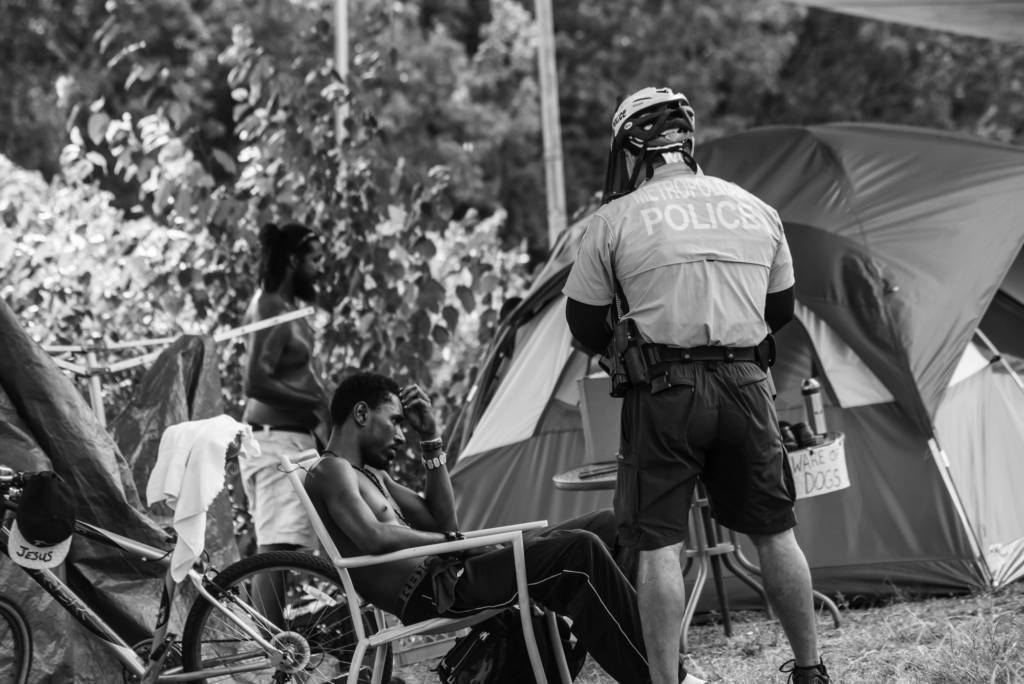Communities are at their strongest when members share responsibility for each other and come together to face challenges. Members of strong communities pool resources for the common good, reaching out a hand when someone else faces danger or crisis. For communities today, this means doing something about the fact that there is simply not enough affordable housing to keep all of our community members safe, stable and out of homelessness.
Too many communities, however, are using handcuffs instead of housing, aggressively deploying police to address the crises of homelessness and poverty. The use of law enforcement to address a social problem erodes community trust, further exacerbates the challenges that poverty and homelessness already pose to people, and does nothing to increase community safety. As people are funneled from police interactions into the criminal justice system, it’s also a far more expensive strategy than providing access to stable housing.
That’s why we at the National Law Center on Homelessness & Poverty, together with hundreds of other organizations and individuals, launched our national campaign for Housing Not Handcuffs on Nov. 15. The campaign calls for an immediate end to the criminalization of homelessness, and for communities to instead implement the best policies and practices that are working around the country, so we can all enjoy a community where no one has to sleep on the streets or beg for their daily needs. (Street Sense has endorsed this campaign.)
The center has documented the growth of criminalization in a new report which reviews 10 years of data on laws criminalizing homelessness in 187 cities across the country. It reveals dramatic increases in the criminalization of homelessness, including a 69 percent growth in the number of citywide laws prohibiting camping, 88 percent growth in loitering or vagrancy laws and a whopping 149 percent growth in laws prohibiting sleeping or living in vehicles.
But the report also shows the strong evidence that criminalization is not only inhumane but also counterproductive and expensive. Charlotte, North Carolina, for example, saved close to $2 million in the first year of operation of a new Housing First program, much of it coming from hundreds of fewer nights spent in jail and hundreds fewer ambulance rides by its formerly homeless residents. The report lauds cities like Indianapolis, Indiana for its new ordinance that prohibits evictions of homeless encampments unless adequate alternative housing is provided first, and Syracuse, New York, which has ended veterans homelessness and is well on its way to ending other forms of homelessness through compassionate outreach rather than harsh enforcement.
The report also highlights several recent federal steps taken to combat criminalization. In August 2015, the U.S. Interagency Council on Homelessness published guidance that called forced dispersal of encampments “not an appropriate solution,” and the U.S. Department of Justice filed a statement of interest brief, stating, “Criminally prosecuting those individuals for something as innocent as sleeping, when they have no safe, legal place to go, violates their constitutional rights.” In both 2015 and 2016, the Department of Housing & Urban Development inserted a new question into its application for a $2 billion grant program giving local governments and providers’ higher scores, and potentially increased funding, if they demonstrate they are preventing the criminalization of homelessness. And this past June, the White House created the Data-Driven Justice Initiative to work with counties to stop the cycle of jails, hospitals and streets for homeless persons.
The Housing Not Handcuffs Campaign has model polices for the local, state and federal levels. We call on local and state governments to prohibit law enforcement from profiling individuals on the basis of perceived housing status and invest in more comprehensive long-term housing options, improve police training on interacting with homeless communities and ensure that homelessness is not treated as a crime. The federal government similarly needs to increase its direct investment in affordable housing and create further incentives for communities to stop counterproductive criminalization practices and open their eyes to the need for alternatives.
If you want to see an end to homelessness in your community, endorse our campaign for Housing Not Handcuffs, learn more about the best practices that are working around the country and call for an end to criminalization and more support for housing so we can all enjoy a community where no one has to sleep on the streets or beg for their daily needs. The campaign has already collected some high profile support, including statements from former Attorney General Eric Holder, Syracuse Mayor Stephanie Miner and New York City Councilor Stephen Levin. To add your voice, please visit housingnothandcuffs.org, follow us on Twitter at @HNHCampaign, and tag your own stories of criminalization, or success when you have housing, with #HNHNow.








